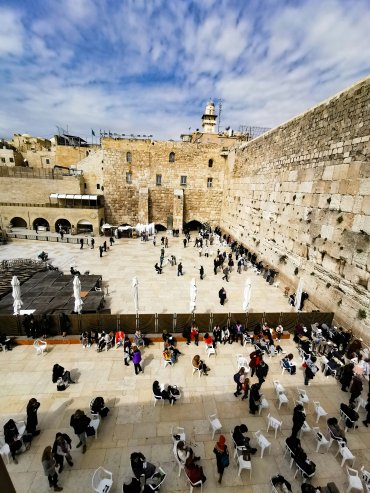How to Make Miracles Happen
Chanukah and miracles. The words go together like latkes and oil. Ask most people and they can tell you about the two pivotal miracles that took place on the holiday of Chanukah: the miracle of the few over the many and the miracle of the oil which lasted eight days.
What is interesting about the nature of Chanukah’s miracles is that the events of the holiday took place after the Jewish “Age of Miracles.” Historically, the Second Temple era, the era of the Maccabees, was a period of hester panim, a time when G-D hides His Presence from the world. This period began after the First Temple’s destruction and continues to this day. Until then, there were prophets speaking the word of G-D in the streets and open miracles, such as a Heavenly Fire consuming sacrifices, daily. After we were exiled by the Babylonians, we gave up prophecy and the well of outright miracles seemed to dry up overnight. By the time the Maccabees staged their famous rebellion against their Syrian Greek overlords, we had had roughly two and a half centuries to get used to this new, miracle-free, reality.
So what happened? Why the sudden reemergence of miracles right then?
The answer has to do with the nature of miracles. Usually, the word conjures up great and powerful events. The term miracle brings to mind the splitting of the sea to allow the Israelites to pass on dry land, the mighty walls of Jericho tumbling down to shofar blasts, and the sun stopping still in the sky. We consider these miracles because they are acts that go against the laws of nature. Because they are supernatural, seeming above the laws of the natural, we are in wonder of them.
However, in defining miracles in this way, we are doing ourselves a disservice.
There is a story in the Gemara about a Rabbi Chanina ben Dosa. One Shabbat he came home to find his daughter distraught. She explained that when setting up the candles, she had accidentally placed vinegar in the bulbs instead of oil. Now when the wicks burned down they would go out for lack of fuel. Rabbi Chanina ben Dosa declared, “The One who makes oil burn can make vinegar burn!” Sure enough, the wicks consumed the vinegar as they would have oil and remained lit.
Rabbi Chanina ben Dosa’s point in this story is not that G-D can perform a miracle and make vinegar combustible, but rather that G-D constantly performs a miracle by making oil combustible.
You see, the fact that I can drop an object and it will fall to the ground instead of rising to hit me in the face is a miracle. That I can heat an egg in a frying pan and it will solidify into an omelet is a miracle. That I can skin my knee and the wound will heal itself is a miracle. Because we believe we know all the rules, we take these miraculous occurrences for granted. Daily exposure has dulled our appreciation for these “mundane” miracles. It is only when something goes wrong—a wound refuses to heal, for example—that we suddenly remember that nature is simply a miracle that happens on a regular basis.
Judaism asks us to scrutinize the world and see it as a miraculous place. Every morning we thank G-D for allowing us to wake up, for allowing us to stand, for allowing our eyes to open, for spreading out the land so we can walk upon it… All of these blessings force us to acknowledge nature as a gift, not a given.
The Syrian Greek philosophy opposed this idea. The three cardinal offenses of that time were Shabbat, Rosh Chodesh and Brit Milah. In all three, we look at something natural and declare it spiritual. We look at the days of the week and by singling one out for rest, recognize how G-D allows for creation to happen on all the others. By setting aside a day as Rosh Chodesh, we examine time and its passing, and how different areas of the year lend themselves to specific cycles and character. And when we perform a bris milah on a boy at eight days we proclaim that our bodies are more than physical shells that have biological functions; they are miraculous vehicles that we’ve been given which can achieve great things. The Syrian Greeks wanted us to look at the world and see it as a physical place. ‘What you see is what you get.’
We refused.
For this reason we were granted the first miracle, that of winning the war. Winning a war in and of itself is not a supernatural thing. Countries do it all the time. One could even argue that this was nothing miraculous in a small force overtaking a significantly larger one. The Jews were on their own land, one could say. They had a tactical home advantage. Everyone knows how powerful guerrilla warfare can be.
But we chose to see it for what it was: a Divine Act. Instead of rationalizing it away and taking credit for appearances, the Jewish generals and army recognized the Source of every move on the battlefield.
Because the Jews of that time chose to see miracles in the mundane, they were worthy of a second miracle, one that was of a more obvious nature: the miracle of the oil. This took place even though it was officially ‘past the Age of Outright Miracles’ for the simple reason that the people who experienced it saw everything as a miracle. When you view the world in that way, then every day is an Age of Miracles, and miracles happen every day.
In this way, we too can harness the power of the miraculous. If we train ourselves to see every thing that happens, every thing that exists, as a supernatural occurrence, then we won’t have to pray for a miracle.
Because we’ll already be experiencing hundreds.
If you found this content meaningful and want to help further our mission through our Keter, Makom, and Tikun branches, please consider becoming a Change Maker today.







